Sonny Rollins' Birthday Bash
“Then Ornette Coleman walked out on stage. The place went, if I may use a technical term, batshit crazy. Everybody on their feet, yelling, screaming. Ornette soloed, then he and Sonny traded, which pushed Sonny into a more free place than at any other time during the show. It was wonderful. At that point, the band was Sonny Rollins, Ornette Coleman, Roy Haynes and Christian McBride. More than 240 years living up there on stage.”
-Sonny Rollins’ 80th birthday concert sounds like it turned out to be one hell of a show.
Obituaries: "True Blood" Season 3 Finale Killed by Alan Ball Disease
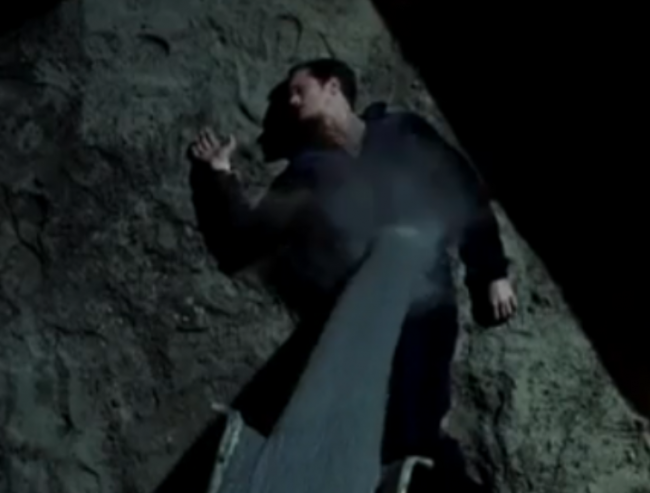
Alan Ball Disease, a chronic but highly treatable autoimmune disorder in which a television show eats itself alive from the inside out without treatment, at last claimed last night’s season finale of “True Blood.” Characterized by a rapid production of unrelated plotlines and an obsessive, almost paranoid attention to their pointless unraveling and their attending tableaux, Alan Ball Disease is now recognized as the number two killer of quality television. (Coked-Up Pandering Network Exec-itis is still #1, according to the CDC.) The prime issue in diagnosing Alan Ball Disease is denial. Throughout a television season, a producer and a viewer both engage in a strange dance of mutually-agreed obliviousness.
“There just couldn’t possibly be too many plotlines in which the characters do not engage each other,” everyone thinks, ignoring the horrible stench and rot. The signs of the disease are quite clear to a neutral third party, however, simply by viewing the “Last Week On…” opening teaser. When what is intended to be a simple refresher for regular watchers or a brief introduction for new viewers becomes twisted and gangrenous, this is a clear indicator of advanced Alan Ball Disease.
There is no reason for producers and viewers to allow this travesty to go undiagnosed and fester before the public! TV doctors all over the country watch the third season of “Six Feet Under” for a case study in this tragic affliction of quality television.
And yet, to this day, sometimes television shows needlessly come sputtering to a sad halt before our very eyes: plotlines shredded, foreword action stalled, minor characters trotted out to provide a sense of conflict, tacky conclusions tacked on-season finales with neither a cliffhanger nor a satisfying resolution appended. What a tragic waste.
Rosecrans Baldwin and Maud Newton, This Wednesday
Things to do: Mark your calendar for Wednesday the 15th, when Awl pals Rosecrans Baldwin and Maud Newton will be discussing Baldwin’s debut novel You Lost Me There at McNally Jackson Books at 7PM.
The First Interview: Meet Josh Simpson, the Man Behind Twitter's @BPGlobalPR
by Mat Honan
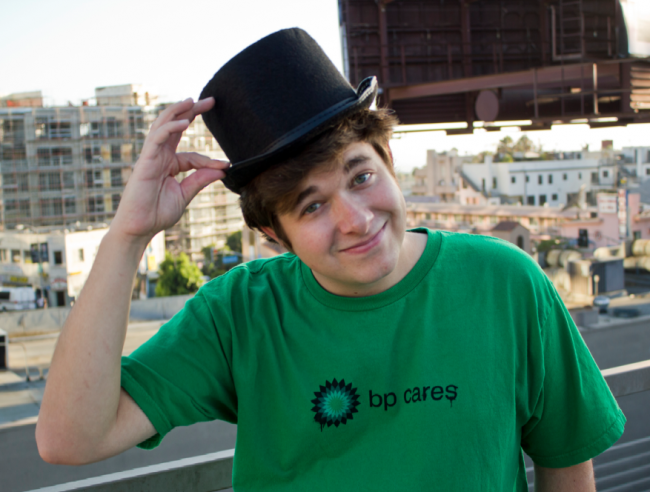
On May 19, @BPGlobalPR started sending out messages about the Gulf oil spill to Twitter. The parody account took on the persona of an inept and insensitive public relations pro working at BP-and it viciously skewered BP’s messaging attempts from behind a veil of anonymity. Within a week, it ate Twitter.
The writer’s identity became the guessing game of the summer, one that I became deeply enmeshed in after a reporter incorrectly wrote that I had outed Twitter provocateur Mike Monteiro as the account’s author. (I had not.) Ironically, however, the erroneous story eventually led me to the 26 year-old prankster behind the account who, after much cajoling (and some minor threats), agreed to be interviewed on the record. Meet Josh Simpson, better known as @BPGlobalPR.
Awl: Are you Mike Monteiro?
@BPGlobalPR: No. No I’m not. But I do have a lot of respect for that guy. When all that was going on I didn’t envy him. I think he handled it well. I contacted him at one point to tell him I felt bad for him.
Awl: So who are you?
@BPGlobalPR: I’m Josh Simpson, I’m a comedian based out of Los Angeles. Before all this, I was a producer and writer for Funny or Die. I’ve done some acting on “Reno 911,” the short-lived “Tonight Show with Conan O’Brien”. I perform regularly at the Upright Citizen’s Brigade (UCB) theater on an improv team, and I write for a sketch show and a talk show there as well.
Awl: Were you doing this all by yourself?
@BPGlobalPR: No, not at all. The idea was mine, and all the long form writing, talks, and speeches were me. But a lot of tweets — a lot of my favorite tweets — weren’t mine. I edited and maybe tweaked some of them, but there’s no way I would have been able to come up with the quality or volume of jokes without a good team. We had about 15 people, and those writers deserve a lot of the credit. Some contributed every day. My dad did one, even. I sent him a message and told him about it, and I was like, “fuck, I’m not sure what he’ll think.” But he responded immediately with a joke.
It was nice to create something that could be inclusive with people’s frustrations. I made it purposefully non-partisan for that reason. As much as I could, I mean. When you’ve got Joe Barton grovelling on the House floor, I had to say something about that.
Awl: Why did you start the account? What were you hoping to accomplish?
@BPGlobalPR: My initial motive was just to mock them. It wasn’t something I’d been planning. I was home sick from work, perusing the news, and I honestly started it on a whim. One morning, on May 19, I saw a video on Huffington Post where a CBS reporter was told by the U.S. Coast Guard that if they didn’t get off the beach they’d be arrested. When the reporter asked how the Coast Guard could do that on a public beach, they responded, “it’s BP’s rules.”
It was very obvious to me BP was more worried about its image than about actually letting people see and understand what was happening on the Gulf. I was literally taking a whiz when I had this idea: How could I be BP’s public relations team on Twitter?
I started on a Wednesday and did a few tweets to find the voice. If you look at those first tweets, they were really silly. We definitely found the voice later on, that was more like official PR-speak. That Friday I started focusing it more, and following people to get their attention. Roger Ebert retweeted it and it just went from there.
Awl: How long did it take to catch on?
@BPGlobalPR: By Saturday. Roger Ebert retweeted something I said, and then it just didn’t stop growing. That weekend we gained 5,000 followers. It was gaining like 50,000 a week and didn’t start slowing down until about 170,000 or 180,000. The second week, I went to New Orleans, because I felt like I couldn’t make fun of this without also doing something about it.
Awl: Were you at all alarmed when it blew up like it did? I mean, you certainly weren’t under the radar once Ebert re-Tweeted you.
@BPGlobalPR: I was alarmed because I didn’t expect it to blow up like it did. I could refresh my browser again and again and there would be different reactions every time. Every time I wrote a tweet it would get retweeted like 200 times. That first weekend, when it was blowing up I thought, ‘well this is obviously getting a lot of attention and by Monday it will surely have BP’s attention.’
What saved me, I think, was a happy accident from that first weekend. I’d been responding to people who were upset with BP saying, “I’m sorry you’re upset. We’re trying to make this right. Let us send you a free BP Cares T-shirt for $25 shipping.” And then some user started the hashtag #iwantmybptshirt. And I was like, ‘oh, man, now I have to make a t-shirt.’
So, I contacted a friend from Street Giant, and we created this very simple BP Cares t-shirt. By Monday morning, we’d already raised a few thousand dollars for charity, which we made abundantly clear. So, if they wanted to shut me down, they had a real mess, because I’d already gotten attention and I was raising money for charity to help restore the Gulf. It put them in a pickle. I didn’t know how they’d handle it, but I knew they weren’t going to shut me down.
Awl: Did you ever get any blowback or even contact from BP?
@BPGlobalPR: Not directly, no. Just through Twitter.
Awl: Tell me about that. Twitter told you you had to make it clear it was a parody account, but what happened once you did? Your account was compromised, right?
@BPGlobalPR: I can’t totally confirm that. But we posted a Twitpic, and got an anonymous email from a hacker, saying be careful, that people could gain access to your account via Twitpic. I apologize to Twitter if that isn’t true, but they sent me that.
Then later, Twitter told me to change the bio [to show it was parody], which I did in a little bit of a panic because I didn’t want to get shut down. Afterwards, I was doing my normal thing on Twitter, and refreshed the page, and got a message that my password was incorrect. I had to reset the password, and got back in my account, and the only thing that had chanced was my bio, back to the original. I changed it back. Then it happened a second time, and I reported it to Twitter,and told them that I thought my account was being compromised. It happened a third time, and I said ‘I’m just going to leave it the way it was,’ and sure enough it didn’t happen again after those three times. What it is right now is exactly what it was when it started. But we almost got more interest once we announced we were fake. The New York Times even covered it that we weren’t really BP.
I do want to say one thing. There was this whole controversy of whether or not BP’s Twitter account had been hacked the day they launched Topkill. The morning of Topkill, it was 6 in the morning Pacific time, and I had been up all night, as I had been most of the time. And they had a tweet on their @BP_Amerca account that said “Terry is in charge of operation topkill, gotta find him a XXL wetsuit!”
There had been all these articles saying that BP should find a way to incorporate this bad publicity into their own. As soon as I saw that, that’s the first thing I thought, well, that’s what they’re trying to do. Because one, it was such a stupid joke. It was like a Jay Leno joke. [Jay Leno voice] “Gotta find a XXL wetsuit for Terry!” I never said Terry was fat, because I’m Terry, dammit! That was the first time I realized what they must have felt like, because they stole my thing! My immediate response was, “looks like we’ve got some impostors. Here’s how you can tell us apart, we can say pickle dick and pussy fart.”
Then it immediately got taken down, and BP claimed their account had been hacked. And I just don’t buy it. It just seems implausible to me. Maybe I’m a crazy conspiracy theorist, but I don’t think @BP_America got hacked.
[EDITOR’S NOTE: While this is Josh’s theory, it’s one I tend to doubt. After going back over the entire @BP_America timeline, dating back even before the spill, only the BP Terry tweet was posted from Accessible Twitter. Most of the others were posted via HootSuite or the Web. It seems unlikely that the company would use a new Twitter client to post a single tweet.]
Awl: What happened when you went to New Orleans?
@BPGlobalPR: That was when I realized the severity of the situation, I’d been poking fun at BP, like poking at the beast, but when I went to New Orleans I realized: it IS a beast. Meeting guys like professor Rick Steiner, who explained how BP and oil companies in general try to weasel their way out of cleaning up their mess.
For instance: the dispersant. The dispersant is criminal. It just created plumes of underwater oil and cleaned up the huge slicks on surface. They just put everything underwater, and actively made the problem worse. I realized how tied up the government is on all this — the MMS, the EPA. I don’t trust a thing those guys say. I was really disappointed when the White House said that there was only 26 percent of the oil remaining in the Gulf, because that’s just not true. This is a big problem. These guys are going to continue milking oil from our coasts in a way that obviously is not safe. And they’re going to make huge profits off of it, with the help of the government.
This is how far these guys would go. I met a person who had worked for BP for three weeks, who had to quit, because the doctor said their lungs looked like someone who had been smoking three packs a day for 15 years. Just from working out there on the water. This person told me BP cleanup crews were basically props for photos, and weren’t able to wear respirators. Not only that — and while I don’t have any way to confirm this, I do believe this person — he told me that when the cleanup crews were done with their mission, BP would give them cigars and take photos of them smoking them so at some point in the future they could deny liability.
Awl: You were the first to follow the BPGlobalPR account, which almost got you busted by Adweek. Did you have to learn more about being stealthy as you went on? Were you ever worried that you would be exposed?
@BPGlobalPR: It was AdAge. I wasn’t that worried. It’s very easy to lie to the media. They kind of take you at your word. I got a call at work from Funny or Die’s publicist, and she said she had someone at AdAge who wanted to know about the BP Twitter account. “You can give her my email,” I said. “Don’t say it’s me, but I can point her in the right direction.” [The reporter] emailed me, and I made the mistake of replying to her with my phone number in the email. And she called me. I was on the phone with her and I said “I’m not the one who started it, but I can give you his email.” From then on I just used that email and it was pretty easy.
At Twittercon I had the genius idea to end my speech by running out of the room in a panic. I literally ran out of the room and ran outside to get a cab. The major problem with that plan is that I was wearing a ski mask and it turns out it’s very hard to hail a cab in New York in a ski mask.
One guy, this reporter who was not a very nice guy, chased me out of the building and got a picture of me with my ski mask up, in profile, getting into a cab. He snapped the picture and then he started looking for a cab also. What he didn’t realize is that my cab driver wouldn’t drive me anywhere. He was on break, and also was not thrilled to have a guy in a ski mask in the back of his cab. I was like almost in a shouting match with him, trying to get him to drive me. But I had to exit the cab, and I got behind the reporter and then got in another cab and left.
You know a lot of people in UCB and the comedy world knew, and no one said a thing. A lot of people could have outed me, but nobody did. I kind of expected to be outed at some point, especially because my name was associated with it early on.
[EDITOR’S NOTE: It is easy to lie to the media. So we asked Josh for some proof of his identity. He was able to tell us about a TED appearance long before it happened, but we wanted something more. He responded by sending us a secret message via email, and then repeating the message via a direct message on Twitter from the @BPGlobalPR account. We have reproduced this secret message below.]
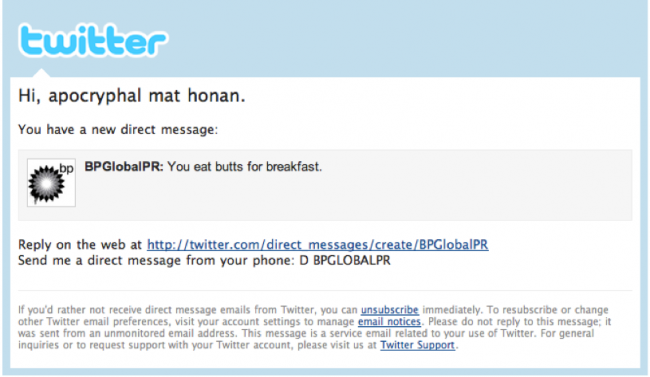
Awl: What did you think about all the speculation as to who was behind the account? I heard everything from a “Colbert Report” writer to Conan O’Brien himself.
@BPGlobalPR: It amused me. I was flattered by most of that. I like Conan O’Brien a lot and I was pretty involved with Funny or Die’s “I’m with CoCo” stuff. Even Mike Monteiro, that’s not the worst guy to be. It was all flattering.
Awl: Seriously, is this Mike?
@BPGlobalPR: This is not Mike. I owe that guy a beer
Awl: How do you feel about all the other similar accounts, like @Gulf_Pelican, or @ATTWirelessPR, or the @iTunes10icon? Kindred spirits or copycats?
@BPGlobalPR: It was very nice to start a meme. From the beginning, I encouraged people to send in BP jingles, song parodies, I asked for BP billboards, I realized it would be more powerful if I could get people involved. The great thing about Twitter is that people are actively involved — they have to hit follow. As to the others, I was mostly flattered.
There’s one now for Park 51 that’s… I made a few choices from the beginning to try to keep it tasteful. I never mentioned the eleven that died [during the rig explosion], I never criticized BPs attempts to actually cap the well. I didn’t want to be cynical about that. I wanted to skew their PR and mock their messaging attempts.
I will say, part of the reason it worked is because the name was kind of real. It was the first one and people were confused by it. But everyone knows it now. If you really want to jack someone’s brand on Twitter, I suggest you don’t use “GlobalPR.”
Awl: But you are building a WorldGlobalPR website, right? What’s that about?
@BPGlobalPR: The basic idea is that I want to be a hub for fake PR that encourages corporate responsibility. I’m building a website that I want to be a reaction to spin. To be an antidote for spin. A site where, when people want to respond to spin, can do whatever they want on there. They can publish a satirical, Onion-style article about a brand. They can create satirical graphics or logos. They can do all these things to respond to spin. It’s all going to be filtered through me, you won’t be able to just put something up on the site, but I want it to be a hub for that, and to create a network that will allow us to hopefully pull off some of these publicity stunts in real life.
Awl: Sort of a culture jamming kind of site?
@BPGlobalPR: I’m not even really sure what that means.
Awl: Do you think of yourself as an activist, or a comedian?
@BPGlobalPR: A comedian. I got roped into the activism world. I care about things and want to change things. But I think what makes me a good activist is my sense of humor. That’s what I have to offer, what my writers and I can offer that I think would be hard to match. The activism is a happy accident. This worked because I had a target. I’m not sure it works for me to promote something. I had a victim. I’ve stumbled upon a way to use humor to maybe do a little bit of good, but I’m not going to fool myself into thinking I’m changing the world.
Awl Did you ever think this could be a good career move?
@BPGlobalPR: I never worried about it from a career standpoint. I just had faith that if I kept doing the right thing with it, it would be fun. I’m working on a book and a TV pilot, and you know, who knows if any of that will happen. But it seemed clear that the account would be getting attention and, so, sure I hoped it would get a little print afterwards. I want to write comedy.
I started all this just to make fun of BP, but I quickly learned that these people aren’t to be trusted. The only way it will turn around is if people start giving a shit. Which I’ve started to do. Admittedly, I wasn’t that engaged before. But I want to stress, this problem is not going to go away unless people start giving a shit. Don’t believe what they’re trying to tell us. It’ll happen again unless people start caring.
Awl: So now you’re outed. What’s next for you?
@BPGlobalPR: I don’t think revealing myself will keep me from doing anything I want to do. I’m not sure I’ll be able to replicate what I did with BPGlobalPR on Twitter, so I’m going to build on the GlobalPR idea rather than hoping I get struck by lightning twice. The difference between myself and someone like Banksy besides the fact that Banksy is about a thousand times cooler than me, is that what Banksy does is against the law. If you find out who Banksy is, he can’t do his thing anymore. That doesn’t apply to the Internet. Anyone can do what I did and part of the reason I wanted to reveal my identity was to show that I am a nobody. I expect people to be underwhelmed.
Mat Honan is a contributing editor to WIRED magazine, and a co-founder of Longshot magazine. Self-Serving Disclosure: Josh conceptualized and shot this video for my magazine. Futhermore: Awl editor Choire Sicha is one of the writers for my magazine. Choire is likely to earn somewhere in the neighborhood of 8 or more dollars if I sell a lot of magazines. This very Q&A; could, in fact, help me sell magazines. Please buy my magazine.
Trees and Plants of Human Use and Significance

Recently I spent a week in Ithaca, where I went to Cornell from 1986–1990, or six hundred million years ago. Not having been there since graduation, I immediately noted a very important difference between my present and former self: namely, I couldn’t wait to spend some time in the botanical gardens, toward which I had been largely oblivious as an undergrad.

I started out in the Robison York State Herb garden, where-because it was August and the campus was deserted-it was just me and 500 herbs (and “plants that have human use or significance”). These included Herbs of the Ancients, Bee Herbs, Culinary Herbs, Dye Herbs, Economic Herbs, Fragrant Herbs, Herbs in Literature, Medicinal Herbs, Herbs of Native Americans, Ornamental Herbs, Sacred Herbs, Tea Herbs, Savory Seed Herbs, Tussie-Mussies and Nosegays (used to ward off the contagion of conservative assholes since the middle ages), Scented Geraniums, Salads and Potherbs, and Edible Flowers.

I gravitated toward the dye herbs, which included the zinnias, whose orange petals were among the brightest in the garden. I learned that every zinnia, no matter what color, has the same dye substance, which means that each will turn wool a shade of yellow. Not being a scientist, I had no idea why this might be the case, but I regretted that I would not be returning back to New York City with a bright orange wool sweater. I wondered if the Hopi Red Dye Amaranth would turn the wool of my imaginary sweater red, but the sign did not indicate one way or the other.

In the Echinacea patch, I was struck by the fame of the flower as a homeopathic remedy against the common cold, when more obscure plants (at least to me) are possibly more deserving of fame, such as the Madagascar Periwinkle (part of the awesomely named Dogbane family), which is the source of chemotherapeutic drugs used to treat childhood leukemia and Hodgkin’s disease. I imagined a corporate conference room twenty years ago, where some marketing genius made a pitch to sell Echinacea to the masses: “Everyone gets colds, right?” says Don Draper. “But everyone hates hippies. We’ll just clean up the label to make it look ‘scientific’ and we’ll pay some real doctors for testimonials. Peggy, quit being a stupid bitch and get me a drink!”

I went to the winter garden, which despite the lack of snow was still beautiful, filled with exquisite conifers whose branches languidly draped over the stone walls. If I had to pick a favorite, it would probably be the Colorado Blue Spruce (Picea pungens ‘procumbens’), although even the lowly Juniper looked magnificent with its tiny, variegated needles spread out like a miniature forest.

I next went up to the plantations, which is what the arboretum is called. I had actually spent time here as a student, running fartleks (that’s Swedish for “intervals,” Beavis) with the cross-country team, and-as I walked around, enjoying the panoramic views-I felt relieved not to be on the verge of puking my guts out. I drifted over to a sugar maple (Acer saccharum ‘arrowhead’) and absently turned over the identification tag; next to it I was surprised to find a second tag, explaining why the tree had been planted.
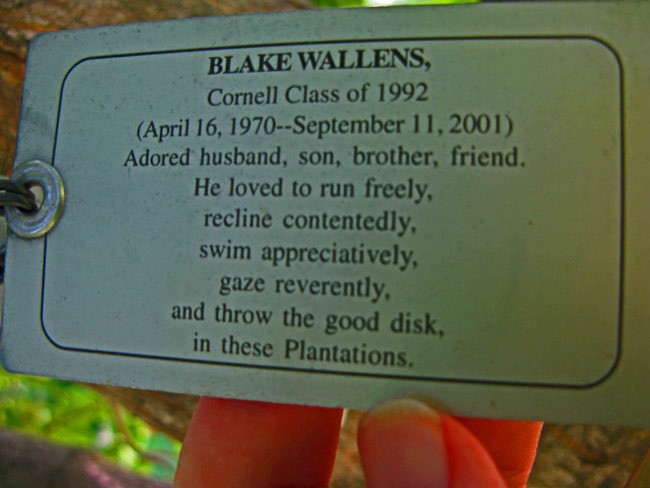
I did not know this guy. Yet I felt a genuine sorrow that of late has been largely absent for me in New York City, where I tend to view the political machinations surrounding Ground Zero with nothing but cynicism. I know this is a defensive reaction; in some ways the day is still too close and too politically charged to think about with the sensitivity it deserves, at least if we focus on those who died (each a tragedy, as the simple tag in my hand made clear). In the city, I can’t separate my grief for what actually happened from my anger about what the day has come to represent, so it all sits atop my psyche like a heavy, undigested stone. But here, two hundred miles away, this uncomplicated tree seemed like the most appropriate form of remembrance. I was grateful to discover that my capacity to grieve had not been completely destroyed, when over the past decade there have been too many times when I have been inclined to think the opposite.

Matthew Gallaway lives in Washington Heights and is the author of the forthcoming novel The Metropolis Case
.
Off to the Movies? Would You Like Some World Peace And/Or Pepsi?
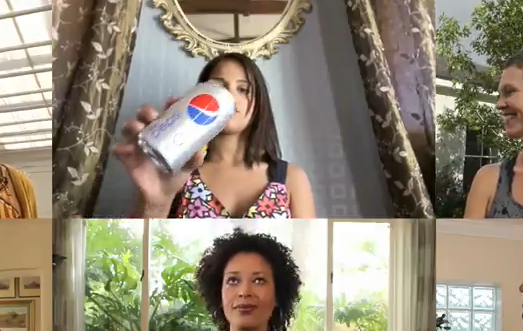
It’s only in the last ten years or so that we in the US began seeing commercials before the movie. The exotic and bizarre cinema-going experience in the UK, which once included not only the opportunity to buy cocktails in the lobby and to smoke (usually in the balcony) during the movie (I know, gross, whatever, I am just saying-it was a lot worse on the plane, believe me), has featured commercials for about forever. I had a special fondness for the hallucinogenic Babycham ones (“Nothing sparkles like a Babycham!”).
Complaints about this relatively new practice in the U.S. seem to have fallen on deaf ears, in part because moviegoers don’t seem to mind seeing a few commercials before the trailers, while they are still blabbing with their mates and eating popcorn. The revenues are perfectly staggering: well over half a billion dollars in 2008. Recent news indicates that we’ll be seeing more and more such commericals, with some firms promising to screen “advertainment” (#$*!) programs of up to 20 minutes’ duration before the movie.
I bring this up because of the Pepsi ad that has been running at the Five Star Los Feliz 3 for the last month or two.
It features reasonably appealing music-video graphics set to the Black-Eyed Peas song “One Tribe,” and touts the Pepsi Refresh Project, which aims to “give millions in grants to refresh individuals and communities.” This attempt to “rebrand” the idea of community involvement or charitable works with the Pepsi-related term “refreshment” is weird enough on its own. But there is more to it.
In sharp contrast to the “stand apart ad” that Thomas Frank and David Foster Wallace dissected with such brilliance (in The Conquest of Cool and “E Unibus Pluram” [PDF], respectively,) showing how notions of “individuality” and “uniqueness” were successfully coopted in order to sell you stuff in the late 20th century (“as unique as you are,” that sort of thing), Pepsi’s “One Tribe” ad attempts to take ownership of the idea of community and social responsibility. Because you’re watching it in a real community, instead of alone in front of the TV-and I would argue that the closest many of us can feel to a group of strangers is in an audience for entertainment, whether at a movie theater, a sporting event or a nightclub-the implications are that much more intrusive and disquieting.
After the campaign to seduce consumers into parting with their cash by appealing to their “individuality” and “rebellion” lost steam, advertisers developed a more transgressive line. By the 1990s, commercials almost uniformly sought to out-ironize their audience, as Zack Stentz wrote:
[T]he medium has stifled mockery and opposition by beating viewers to the punch and doing the mocking for them. By gently making fun of itself or its own advertisers, be it in a David Letterman monologue or smirking ESPN Sports Center promotion, television lets the watcher feel superior to the common herd and in on the joke, even while he or she is still glued to the sofa.
Pepsi was heavily invested in this approach; Mark C. Miller wrote brilliantly in Deride and Conquer (1986) about the Pepsi “Choice of a Generation” commercial that featured a horde of thirsty beachgoers stampeding to a Pepsi vendor en masse the moment the sound of fizzing soda poured over ice is broadcast along the hot, sunny beach. Commenting on Miller, Wallace noted that “[t]here’s about as much “choice’ at work in this commercial as there was in Pavlov’s bell kennel. […] the point of this successful bit of advertising is that Pepsi has been advertised successfully.”
Pepsi has by now perfected its strategy of creating an artificial connection in your mind between its sugary fizzy obesity-promoting tooth-rotting brown fluid and all sorts of attractive ideas-individuality, ironic awareness and now, just like other companies, it has turned to charity, a green earth and general do-gooding. The sentimental will.i.am may seem to have grown troublingly fame-whoring after the success of his “Yes We Can” video, but there is no question that his music is stirring in just the button-pushing way that Pepsi can exploit really well in order to make these false new connections.
Not unlike the “Yes We Can” video, “One People”-and this ad is the product of TBWAChiatDay, by the way-concerns itself with beliefs dear to the hearts of many (“we are one people,” etc.). And it uses its possibly familiar imagery very well.
But instead of promoting a relatively progressive presidential candidate to a desperate, heartsore electorate, however, this song is flogging soda.
Maybe all this looks benign enough on the outside, like any other Trojan horse does at first. After all, the change (as in coinage) that Pepsi is handing out to all these worthy causes amounts to quite a lot in non-corporate-behemoth terms, and of course that is a good thing. (Pepsi, like all corporations, has charitable giving programs and is also publishing the grants issued under the “Refresh” program.)
But consider what happens when we feel something of significance to have been cheapened and coarsened by its use in advertising. We can hardly even stand it when they use “Ceremony” in an Absolut ad, because a commercial impulse seems to be intruding on what used to be the hallowed ground of pure, disinterested belief or appreciation. Now here is Pepsi, engaging in the co-opting of people’s fondest, most distant hopes, such as racial unity and peace and restoring the forests, and then art-directing and Autotuning and rewrapping them all into a glossy, easily-digested package distributed before the movie, in the interest of profit. And still worse, it’s all being used to make a buck in that rare atmosphere where strangers really do feel a vestigial sense of community. It gets sick when you consider all those diabetic teenagers and millions of empty aluminum cans and lakes of never-decaying two-liter PET bottles out in the Pacific Ocean.
Maybe it won’t take long for the mockery of “One People” to spread around the culture, because of how cheap and sorry the underlying motives are, and how even-cheaper and more useless and destructive the actual product is. I should really hate to hear “one people y’all” become an ironic little joke for teenagers to make when they see news stories of a race riot or a gay-bashing, but I can already see it coming.
Maria Bustillos is the author of Dorkismo: The Macho of the Dork and
Roger Sterling Makes Attorney General Endorsement
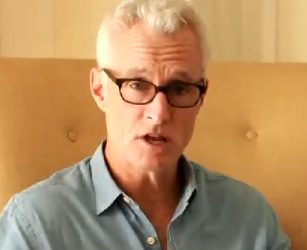
The race for Attorney General in New York City just got rough, what with John Slattery now endorsing Kathleen Rice today. Who ya gonna get this weekend, Eric Schneiderman? Jon Hamm’s busy and Christina Hendricks lives in LA and totally does not care. Game over!
BREAKING! Ana Marie Cox Addresses Her Shocking Decline in Twitter Followers!

Ana Marie Cox has a “shrinking audience,” notes Fishbowl DC in one of those late Friday breaking news items. They mean her Twitter. As of today, “she has 1,449,248 followers.” That’s down from 1.47 million Twitter followers! (Here, give her a pity follow, and, by the way, I guess DC bloggers didn’t get the memo about how Twitter actually works?)
So Ms. Cox was asked about the rapid and harrowing decline in her popularity and had this to say.
“Losing 1.3% of my Twitter followers is the kind of tragedy I would write a mocking Tweet about had I not come to realize that covering the minutiae of the lives and careers of the ‘famous-for-DC’ is exactly sort of bottom-of-the-bellybutton scraping that has caused so many Americans outside the Beltway to look upon our insular culture as something repellent, pitiable and possibly untenable,” Ms. Cox wrote in a statement provided to The Awl. “By the way, is Fishtank hiring?”
You Are Drying Your Hands Wrong

Science wants you to know that you can’t do anything right: “Although hand-dryers are more environmentally friendly than paper towels researchers found that bacteria levels increased when people rubbed their hands together while using them. They concluded that paper towels were the most effective means of reducing the risk of infection after washing.” And don’t get Science started on the way you wipe your ass. Seriously, Science is really disgusted by your entire personal hygiene routine. Science is going to go fix itself a drink and sit in the living room while rubbing its temples and shaking its head back and forth. It would appreciate it if you kept it down, okay? Science is frankly a little tired of you.
Looking Back At The Era Of Insanity
Remember the day that the President of the Unites States had to explain to the nation’s press corps that members of the United States military who were risking their lives overseas should be considered just as American as everyone else and that they were entitled to the same rights and liberties as their fellow citizens? It was bizarre, right? You were like, “That did not just happen.” Man, those were some crazy, crazy times.
